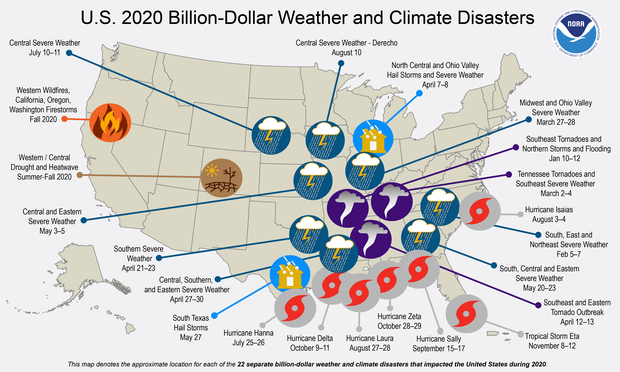Climate Skeptic Part 4: How Much Does Climate Change Cost Us?
How Much Does Climate Change Cost Us?
Part 4 of 7 – Continued From Part 3
Authors: Amber Bieg, Deb LaSalle, Zach Bell, Heather Colwell, Kevin Winslow, Jay Schuyler, Alaina Sisco, Mitch Samson
“During the past 40 years, the United States has experienced approximately 300 weather and climate-related disasters that exceeded $1 billion in losses each,” according to Donald L. Griffin, a vice president at the American Property Casualty Insurance Association. Last year alone, there were 22 climate-related disasters costing over $1 billion.[13] In 2017, climate change contributed to extreme weather events causing at least $100 billion in damages.

Source: NOAA
A 2017 survey of independent economists looking at the effects of climate change found that future damage estimates range “from 2-10 percent or more of global GDP per year.” According to insurance giant Swiss Re, climate change could reduce global economic output by up to 14 percent — or approximately $23 trillion. “This is the potential cost that economies could face should governments fail to act decisively on climate [change],” says Patrick Saner, head of global economic forecast for Swiss Re.[14]
World business leaders and institutions are taking notice and, in some cases, taking action. In December 2017, a group of central banks and other institutions founded the Network of Central Banks and Supervisors for Greening the Financial System (NGFS). The group is focused on defining and sharing best practices for climate-related risk management and green finance. At present, the NGFS counts 42 members and eight “observers,” including the World Bank.
In April 2019, the group issued its first comprehensive report, which listed six recommendations for central banks including accounting for climate-related risks in financial supervision, considering sustainability in portfolio management, disclosing climate-related risks, and sharing data and knowledge.
Other high-profile institutions and banking officials have expressed concern about climate change’s potential effects on the financial system as well. In a 2019 speech, Sabine Mauderer, a member of the executive board of Deutsche Bundesbank, said addressing climate change is a “key factor for economic and financial systems.” The Bank of Canada also expressed concern regarding climate change, calling it an “economic vulnerability” in its 2019 Financial System Review. Bank officials went on to cite the physical damages and costs associated with transitioning to a low-carbon economy.
References
[13] NOAA. Climate.gov. 2020 U.S. billion-dollar weather and climate disasters in historical context. Sept. 27, 2021
[14] Swiss Re Institute. The economics of climate change. April 22, 2021
